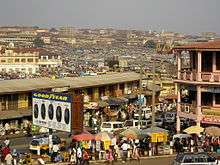Markets in Ghana


Markets are very important in the economy of every country. Ghana, an African country with a population of over 24 million,[1] like all countries in the world has many markets. Some being major and others being minor. Unlike markets in other countries across the planet, Ghanaian markets are unique. Their uniqueness lies in the fact one would hardly find a market that trades in one particular group of wares. In a typical Ghanaian market one can find everything from apples to zoot suits.
History of markets
Trading in the country begun when the first settles arrived in the country. Like many countries in Africa, the main method of trading was through the barter system. People used to exchange goods and services for commodities and services that was believed to measure up to what was being offered. As trade became more liberalized, people used to trade their goods and services for cowries known locally as "cedie. This later became the country's currency - the cedi.
Supermarkets
The Accra Mall remains Ghana's prime supermarket, the mall which started operations in the 2008[2] sought to improve the Ghanaian's shopping experience. It is located on the Spintex road adjacent the Tema Motorway. Another big supermarket in the country is Melcom.[3] The company was established in 1989. In 1991, the primary shop was opened in Accra Central. It has branches in almost all regions of the country including the single largest shop in the nation - Melcom Plus in Kaneshie, covering an area of over 90,000 square feet.[3]
Internet trading
Some amount of trading is done online though this is not widespread. The major online trading sites are:
Street markets
There are ten administrative regions in Ghana with each having its own regional capital. Every region has at least one major street market where peculiar goods and services offered at minor street markets would be readily available and at a cheaper price. Some of the major street markets in the country are:
- Kotokoraba Market in Cape Coast - Central region
- Market Circle in Takoradi - Western region
- Kejetia in Kumasi - Ashanti region
- Kantamanto in Accra - Greater Accra region
- Makola Market in Accra - Greater Accra region
- Kintampo market in Kintampo - Brong-Ahafo region
- Tamale central market in Tamale - Northern region
- Kaneshie market in Kaneshie - Greater Accra region
- Bantama in Kumasi - Ashanti region
- Tafo in Kumasi - Ashanti region
Fire outbreaks in markets
One common issue that Ghanaian markets face is the problem of market fires. These are rampant and the effect, typically, is that goods and structures are destroyed with the cost running into thousands of cedis. These fire outbreaks start from varied sources, that is, they may start as a result of an unattended iron, coal pot fire not turned out to wielders forgetting to turn off their wielding torches. The problem is always compounded because of congestion. Every major market in Ghana faces the problem of congestion. Due to this, fire hydrants have been obscured by stalls, lanes that fire trucks could use to access the market are converted into stores etc. All these come together to cause the kind of destruction that occurs during such outbreaks of fires.
References
- ↑ statsghana.gov.gh. statsghana.gov.gh.
- ↑ The Accra mall one of the most modern shopping malls. accramall.com.
- 1 2 melcomgroup.com - melcolm. melcomgroup.com.